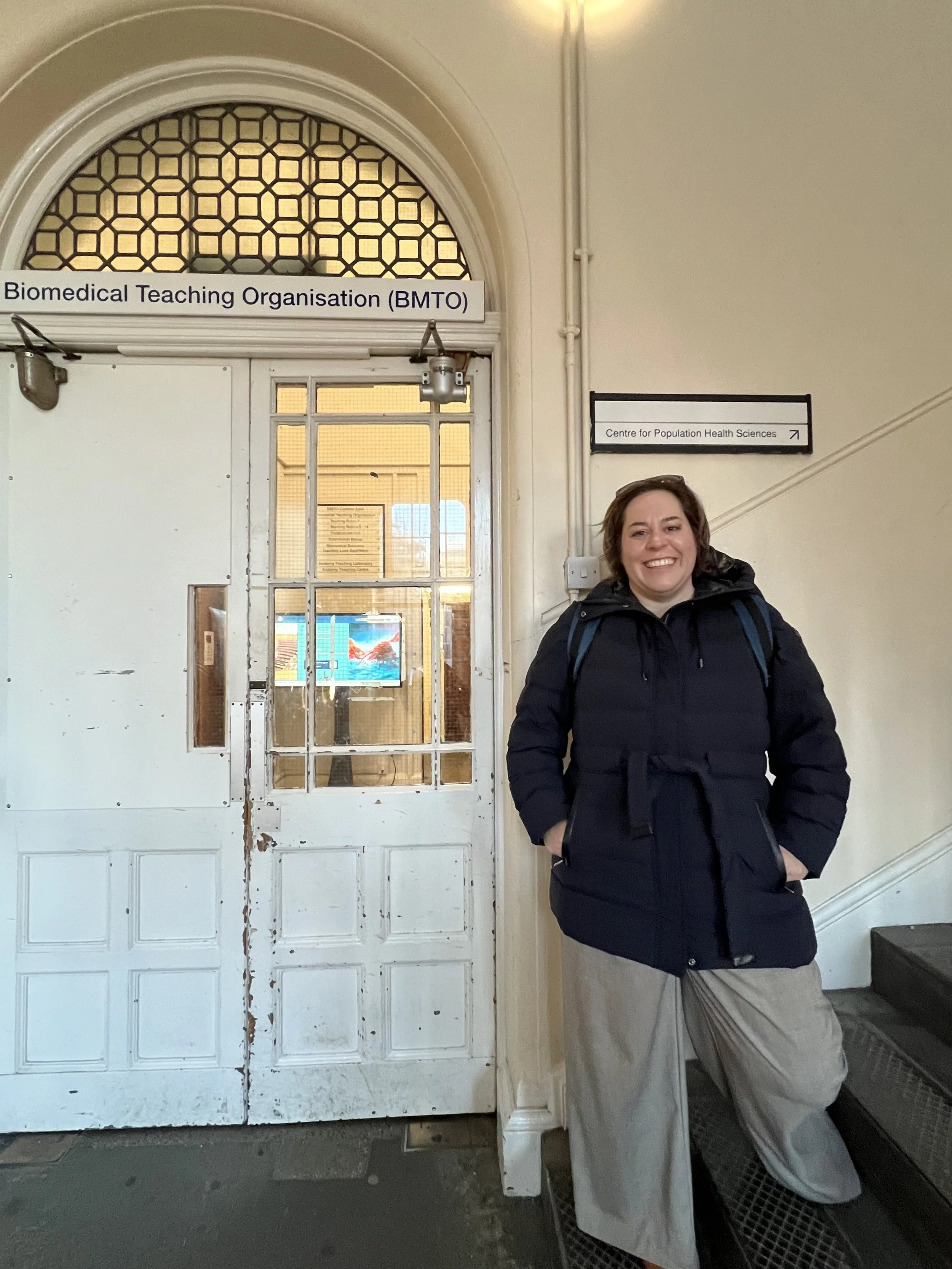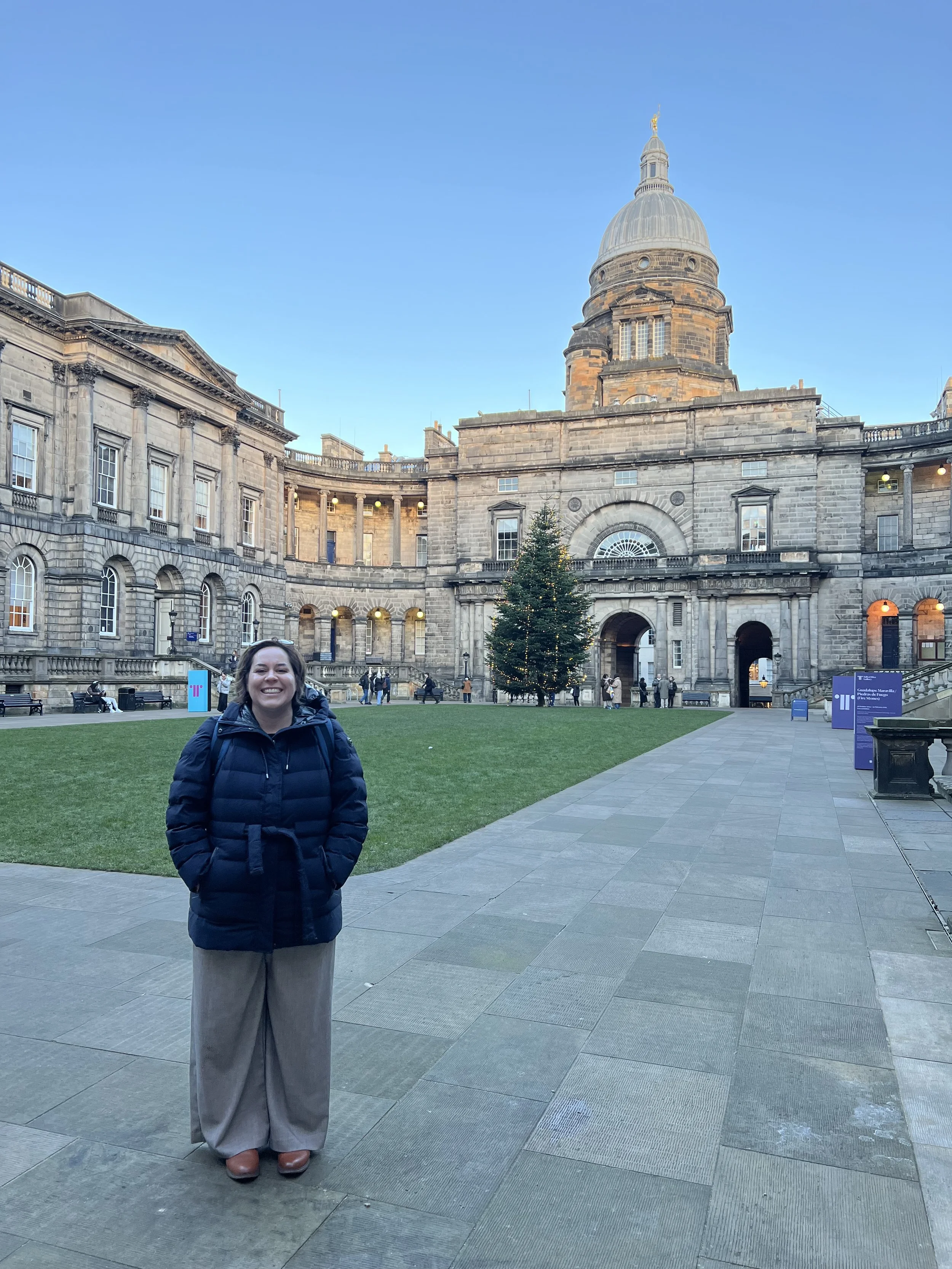Educating Students & Athletes to Erase the Health Disparities for Those with IDD
Dr. Watson
By Claire Watson, PhD, MSPH
It is over 3,350 miles from Western New York to Edinburgh Scotland, but that distance was shortened and the world made a little smaller through my experiences with Special Olympics. I’m Dr. Claire Watson, a university professor and Special Olympics Clinical Director for Health Promotion. In the Fall of 2024, I was on sabbatical and traveled to Europe to share my knowledge with students in the Master of Public Health program at the University of Edinburgh. Over the past 10 years, I have created and led health promotion activities for the local Special Olympics athletes and their Unified partners during our basketball games held at St. Bonaventure University. The athletes who play are elementary through high school students. My goal is to educate and train our undergraduate and graduate health professions students on intellectual and developmental disabilities (IDD) and how to provide impactful interactions and health education to the Special Olympics athletes. The lessons that I’ve learned by working with the athletes and educating our college students were the foundation of my lectures at the University of Edinburgh.
So how did I get involved with Special Olympics (SO)? My first experience was when I was in high school and volunteered at the track and field events held there. More recently, my colleague, Dr. Paula Scraba, who has a background in adaptive physical education, has been integral to hosting and managing our SO basketball tournament. She had asked me if I wanted to include some healthy activities for the athletes in the down time between their games. I created playful games that focused on healthy eating and the importance of exercise for heart, lung and bone strength.
“My goal is to hand the torch to the next generation, to continue to offer access to quality health screenings and promotion that will make a significant difference in the lives of our Special Olympics athletes.”
Unknown to me, Special Olympics had been doing the same thing through their Healthy Athletes program since the late 1990’s. Shortly after our first health promotion event, I connected with our Special Olympics colleagues out of Rochester, NY and they shared with me the types of activities that they have been promoting. Not only did it expand my offerings, it provided consistent health messaging for our athletes, although we work entirely with children and adolescents. I was offered the incredible opportunity to learn more about Healthy Athletes and become a Special Olympics International Clinical Director during the National Games held in Seattle, Washington in 2018. This is where I was introduced to AADMD and had the awe-inspiring moments of seeing these incredible athletes competing and the Healthy Athletes opportunities that are outside of my health promotion discipline. Our discipline includes education and activities on nutrition, exercise, handwashing, Vitamin D and sun safety, bone health, handwashing and smoking/tobacco avoidance.
We also want to have a more complete snapshot of our athletes’ health as we perform a comprehensive health assessment that includes physical measures of blood pressure, height, weight, waist circumference, bone density and questionnaires that ask about athletes’ lifestyle choices for food, activity, hygiene, and smoking. It’s a great way to interact with our athletes but also smart because it’s a touch point where we can see how the athlete is feeling and whether they’ve seen a doctor and we can refer if we need to. Those conversations with the athletes are my favorite as you can hear about their success in their sport and check in on how they’re doing outside of the competition. The lessons that I’ve learned as a Clinical Director are ones that I share with my students because they can then share them with their future patients.
The lectures I composed for the University of Edinburgh were: 1) a case study of our experience with the Unified games and the support we receive through Special Olympics New York and 2) how to successfully manage a health promotion event. I presented to the MPH students and faculty on how I educate our students on the health facets of IDD and prepare our students to manage the health promotion stations. The students utilize the resources from the SO website to learn about how to talk with someone with IDD and the startling health statistics of our athletes. The teaching that I perform annually with my undergraduate and graduate students was similar to what I shared with the students at the University of Edinburgh.
The author, Dr Claire Walson, in Europe
My biggest surprise was that a majority of my students had previously participated as a volunteer at a sports competition for Special Olympics while in Scotland, very few have. Some of the faculty weren’t even aware of Special Olympics and specifically the Healthy Athletes components. Instead of viewing this as an obstacle, this is a great opportunity for me to share our practices and potential with students not only from the UK, but from around the world.
My second lecture focused on hosting a health promotion event and the realities that can make or break the event. This was an online presentation with MPH students across the globe. I discussed that you can plan for everything and should still be prepared for unexpected circumstances, for example, when working at the New York State games in the summer, you always need to be prepared for weather changes, including wind that can blow down your stadiometer (height measuring tool) and ensure it doesn’t hit any athletes. Thankfully, no one was injured and it created a great teaching moment.
The emphasis was on the impact that future health professions students can make in their practice and their time volunteering with Special Olympics. My goal is to hand the torch to the next generation, to continue to offer access to quality health screenings and promotion that will make a significant difference in the lives of our Special Olympics athletes. From my rural corner of New York, to the historic halls of the University of Edinburgh, we can educate students and athletes to erase the health disparities for those with IDD and have a lot of fun while doing it.
About the Author
Claire Watson, PhD, MSPH is the Founding Chair of the Department of Public Health at Gannon University in Erie, PA. She’s previously been the Founding Program Director of Public Health and Health Science at St. Bonaventure University. Dr. Watson earned her PhD and MSPH in Public Health and her MS in Exercise Science. She is a Health Advisory Board member for Special Olympics New York and loves to educate on the importance of prevention and population medicine. Her other love is her son, Alex, who is currently working on his undergraduate degree and will be in the next generation of leaders for positive change.



